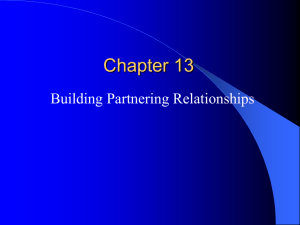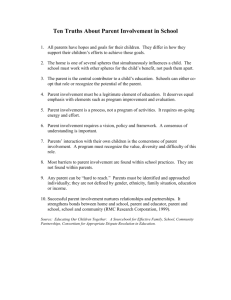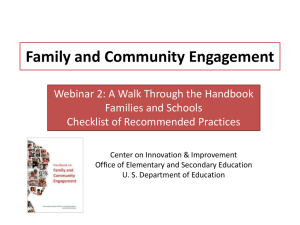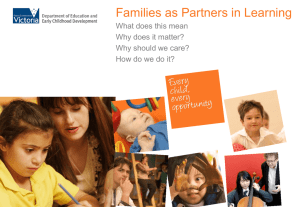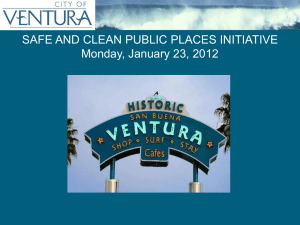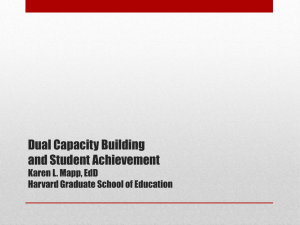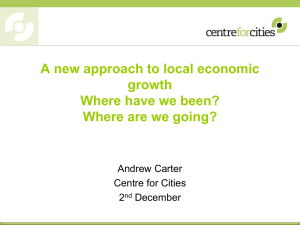DOWNLOADFdA Event Management
advertisement
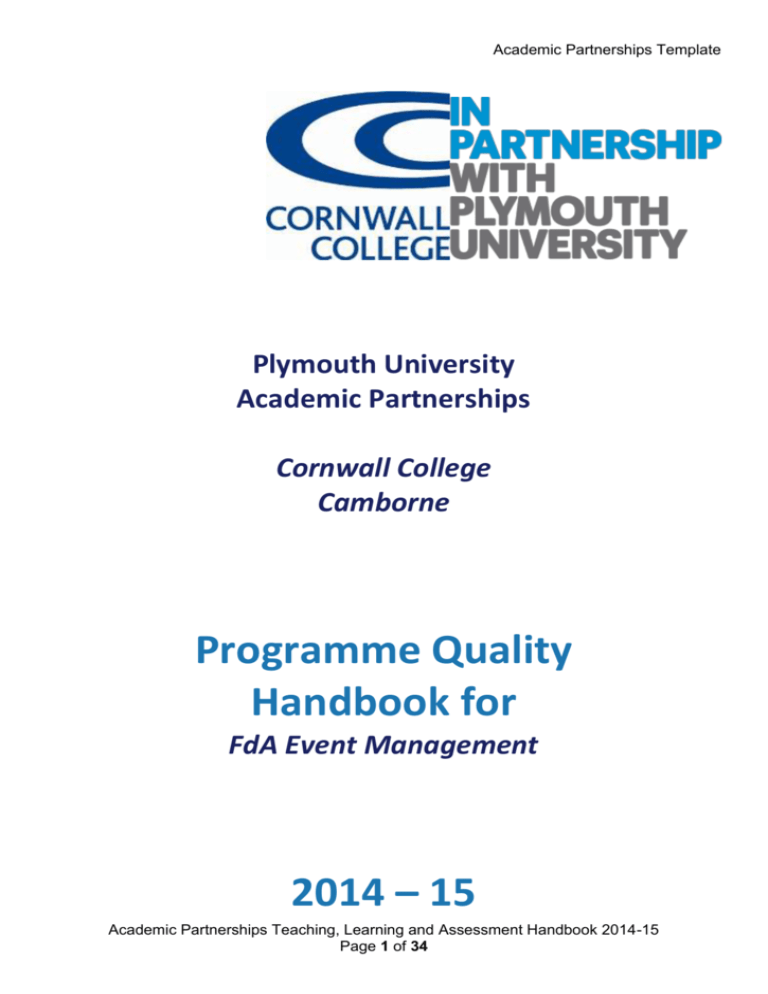
Academic Partnerships Template Plymouth University Academic Partnerships Cornwall College Camborne Programme Quality Handbook for FdA Event Management 2014 – 15 Academic Partnerships Teaching, Learning and Assessment Handbook 2014-15 Page 1 of 34 Academic Partnerships Template Contents 1. Welcome and Introduction to FdA Event Management. .......................................................................... 3 2. Programme Specification ........................................................................................................................... 4 3. Module Records ....................................................................................................................................... 21 Academic Partnerships Teaching, Learning and Assessment Handbook 2014-15 Page 2 of 34 1. Welcome and Introduction to the FdA in Event Management. Welcome to the Foundation Degree in Event Management. Cornwall College is delighted that you have chosen to study with us. We are sure you are going to have a great time here and will get a great deal from the programme. In the past few years event management has become big business in Cornwall with internationally recognised events such as surf and sports competitions, cultural and music festivals being delivered in addition to the already growing sector of corporate trade shows, conventions, fund-raisers and awards ceremonies already taking place. Consequently, more qualified people are being sought to manage and promote these events. This Degree will equip you with professional leadership and business management skills, combined with specialist knowledge of the event management industry. Our delivery team is composed of industry professionals who operate successful Events Management businesses alongside their lecturing. As a student studying this programme you will gain invaluable insight into current thinking and practice within the sector as well as the chance to work alongside these professionals assisting in the preparation and planning of large and small scale events being held all over Cornwall. This programme has been designed to equip you with the skills and knowledge base required to work in your chosen specialism or other graduate opportunities. It is also a platform from which you can undertake additional vocational and academic qualifications. This Programme Quality handbook contains important information including: The approved programme specification Module records Note: the information in this handbook should be read in conjunction with the current edition of the College Student handbook available at (college to add link) which contains student support based information on issues such as finance and studying at HE along with the University’s Student Handbook https://www1.plymouth.ac.uk/studenthandbook and your Teaching, Learning and Assessment Handbook available on your programme virtual learning environment. Academic Partnerships Teaching, Learning and Assessment Handbook 2014-15 Page 3 of 34 Academic Partnerships Template 2. Programme Specification On the following pages you will find the specification for your programme; this provides a detailed overview of the programme as a whole. It explains what you will learn and how you will be assessed throughout the two stages of your Foundation Degree. The Programme Learning Outcomes Map specifies the knowledge and skills you will develop at each stage of your Foundation Degree. Awarding Institution: Teaching Institution: Accrediting Body: Final Award: Intermediate Awards: Programme Title: UCAS Code: Foundation Degree Qualification Benchmark (FDQB): Plymouth University Cornwall College N/A FdA Certificate of Higher Education (CertHE) Event Management N821 Date Produced: December 2008 Foundation Degree Qualification Benchmark and the relevant section at intermediate level of the Hospitality, Leisure, Sport and Tourism QAA Subject Benchmark. Admissions Criteria: Qualification(s) Required for Entry to the FdA Candidates must have: Key Skills requirement And/or GCSEs required at Grade C and above Comments Level 2 Numeracy, Literacy Grade C or above in 3 relevant subject areas including Maths and English Plus at least one of the following: A Levels required: AS/A2/UCAS Normally 120 points (combination of appropriate A levels, Key Skills Points Tariff and AS Levels (Maximum of 40 points from Key Skills) A minimum of one A2 is required BTEC National National Certificate - MP Certificate/Diploma National Diploma at PPP HNC/D Pass level VDA: AGNVQ, AVCE, AVS Access to HE International Baccalaureate Irish/Scottish Highers/Advanced Highers Work Experience Merit level Pass 24 2 D level passes – grades sufficient to reach UCAS tariff of 120 points. Mature students with relevant work experience offers made on interview only Academic Partnerships Teaching, Learning and Assessment Handbook 2014-15 Page 4 of 34 Academic Partnerships Template Other non-standard awards or experiences APEL/APCL possibilities Interview/portfolio requirements Criminal Record Bureau (CRB) check required Mature students or those without formal qualifications are encouraged to apply and cases are taken on an individual basis If a student wishes to claim either APCL/APEL they will need to provide evidence of having experienced areas covered in a module or modules previously. It should be noted that all Learning Outcomes for module(s) being claimed will need to be demonstrated. Application should take place before the module is due to be delivered, and corroborating evidence should be provided, for instance a testimonial from an employer. Applications will be taken to a College Screening Committee, chaired by the Head of Centre, and the student will be informed whether their application has been deemed valid. Students should contact their Programme Manager in the first instance. All claims for APCL/APEL will be carried out in accordance with the UoP academic regulations. Interviews will be held on an individual basis when required. No Aims of the Programme: The aim of the FdA in Event Management programme is: 1. To produce graduates who can critically, systematically and reflectively analyse a wide range of event management scenarios. 2. To develop individuals who will be able to design, finance, implement, administer and evaluate event management strategies. 3. To produce students who can demonstrate a range of academic, vocational and study skills to a level that will enable them to support progression to a one-year Level 3 Honours Degree in appropriately specified articulations. 4. To develop students who can demonstrate a wide range of personal, practical, vocational and transferable skills that will enable them to be effective in seeking employment or developing their role in the event management, tourism and or hospitality sectors of industry Programme Intended Learning Outcomes: By the end of this programme the student will be able to: Explain , interpret and critically evaluate the principal theories and concepts that have moulded the emerging event management sectors Display an insight into the structure of event providers and their sectors and analyse the political, technological, social, environmental and economic factor which affect, or impact upon the supply and demand for events. Analyse and reflect on the different cultural and business concepts, intercultural and international dimensions of events Action plan for and participate in the management of successful events, including the effective management or resources including human (paid or volunteer) financial, venue and sub-contracted resources Academic Partnerships Teaching, Learning and Assessment Handbook 2014-15 Page 5 of 34 Academic Partnerships Template Identify the routes of progression to further study in higher education within appropriate University programmes or the world of work Distinctive Features of the Foundation Degree Employer engagement is a priority for the faculty and over a number of years the tourism department has sought to work with employers who are passionate and committed to driving up quality in the sector. The relationships established with key, local stakeholders has enable ongoing dialogue concerning programme design and content and provided both placement and consultancy opportunities for our learners. Frequent opportunities exist to provide learners with the chance to network with and demonstrate their potential to influential, local employers. The programme offered is inspirational, innovative and memorable and will encourage creative thinking and the development of new ideas. Students will be working in an expanding arena where opportunities exist to develop new perspectives and to challenge convention. Students will acquire in-depth knowledge of event practice that may be applied across many sectors of industry. The programme will prepare students to pursue a range of careers within the event, hospitality, tourism and leisure and sports sectors. The programme is very much in tune with the changing face of the events industry and the need to address greener, social, increasingly economic and corporate issues. The programme will recruit from diverse backgrounds and ages so students can expect to work within a fairly cosmopolitan environment. The College runs a number of related courses so students will be able to mix with fellow students with interests in sport, recreation, tourism, travel, heritage, gastronomy and outdoor leisure. Opportunities to work individually and on collaborative and cross-disciplinary projects that will have real implications in the work place. Learn a range of subject specific but transferable skills Academic Partnerships Teaching, Learning and Assessment Handbook 2014-15 Page 6 of 34 Academic Partnerships Template Programme Specification A: Development of Knowledge and Understanding Learning and Teaching Strategy/Method By the end of the programme the student will be able to demonstrate knowledge and understanding of: Primary the development of events from a range of critical perspectives display an insight into the structure of event providers and their sectors and analyse the political, technological, social, environmental and economic factors which affect or impact upon, the supply of, and demand for, events Lectures and tutorials Directed independent study Learning from work experience Secondary analyse and reflect on the different cultural and business concepts, intercultural and international dimensions of events existing and future issues such as ethics, creativity, sustainability related to event management and to understand their implications on economic planning, host communities and the local environment Case studies Problem-solving exercises Report writing On line Moodle materials UoP student portal NB: Benchmark References Assessment Hospitality, Leisure, Sport and Tourism General Business and management Foundation Degree Key knowledge and understanding is assessed via a combination of multiple choice tests, examinations, essays, presentations and seminar performances. B: Cognitive and Intellectual Skills Learning and Teaching Strategy/Method By the end of the programme the student will be able to: Primary demonstrate an awareness and understanding of appropriate aspects of event management including administration, design, operations, marketing and risk and how they apply to the phases of events, such as initiation, planning, implementation, event and closure operate and effectively manage resources, including human (paid or volunteer), financial, venue and subcontracted and technical resources plan, control, analyse and evaluate events, support service provision and their logistics Class exercises Tutorial/seminar discussions Feedback via coursework assessment process (essays etc) Secondary Policy and practice analysis in surgeries Computer-based practicals on data and measurement problems Academic Partnerships Teaching, Learning and Assessment Handbook 2014-15 Page 7 of 34 Academic Partnerships Template NB: Benchmark References Assessment Assessed discussions Essays/projects/dissertations Examinations/tests Coursework/group work on practical application questions C: Key Transferable Skills Learning and Teaching Strategy/Method By the end of the programme the student will be able to: Primary use a range of established techniques to initiate and undertake critical analysis of information, and to propose solutions to problems arising from that analysis in their field of study and in a work context effectively communicate information, arguments, and analysis, in a variety of forms, to specialist and non-specialist audiences Secondary undertake further training, develop existing skills, and acquire new competences that will enable them to assume responsibility within organisations Library and other research exercises Group work awareness and practice Computer-based learning and assessment Class and seminar interactions and feedback interact effectively within a team/learning group take responsibility for own learning with minimum direction to self-appraise and reflect on practice NB: Benchmark References Assessment Foundation Degree General Business and Management, Hospitality, Leisure , Sport and Tourism Coursework of all types Examination preparation and completion Assessed discussions Group work assessments Academic Partnerships Teaching, Learning and Assessment Handbook 2014-15 Page 8 of 34 Academic Partnerships Template D: Practical Skills Learning and Teaching Strategy/Method Plan, design and execute practical activities using appropriate techniques and procedures e.g. numeric, communication (written and oral) and information technology skills Undertake fieldwork with due regard for safety and risk assessment Field trips Projects Designated tasks Lectures and tutorials Learning from work Plan, design, execute and communicate a sustained piece of independent intellectual work using appropriate media Recognise and respond to moral, ethical and safety issues which directly pertain to event management including relevant legislation and professional codes of conduct. NB: Benchmark References Assessment Foundation Degree General Business and Management Hospitality, Leisure, Sport and Tourism Project work Competence in a range of businessrelated communication techniques Academic Partnerships Teaching, Learning and Assessment Handbook 2014-15 Page 9 of 34 Academic Partnerships Template Distinctive Features of the Foundation Degree Employer engagement is a priority for the faculty and over a number of years the tourism department has sought to work with employers who are passionate and committed to driving up quality in the sector. The relationships established with key, local stakeholders has enable ongoing dialogue concerning programme design and content and provided both placement and consultancy opportunities for our learners. Frequent opportunities exist to provide learners with the chance to network with and demonstrate their potential to influential, local employers. The programme offered is inspirational, innovative and memorable and will encourage creative thinking and the development of new ideas. Students will be working in an expanding arena where opportunities exist to develop new perspectives and to challenge convention. Students will acquire in-depth knowledge of event practice that may be applied across many sectors of industry. The programme will prepare students to pursue a range of careers within the event, hospitality, tourism and leisure and sports sectors. The programme is very much in tune with the changing face of the events industry and the need to address greener, social, increasingly economic and corporate issues. The programme will recruit from diverse backgrounds and ages so students can expect to work within a fairly cosmopolitan environment. The College runs a number of related courses so students will be able to mix with fellow students with interests in sport, recreation, tourism, travel, heritage, gastronomy and outdoor leisure. Opportunities to work individually and on collaborative and cross-disciplinary projects that will have real implications in the work place. Learn a range of subject specific but transferable skills Academic Partnerships Teaching, Learning and Assessment Handbook 2014-15 Page 10 of 34 Foundation Degree Intended Learning Outcomes Map Certificate Level Foundation Degree Intended Learning Outcomes Map 1 Graduate Attributes and Skills Core Programme Intended Learning Outcomes (as worded in the Programme Specification) The FHEQ requirements are already given here in italics Aim Knowledge/ Understanding Students will be able to demonstrate knowledge of the underlying concepts and 1,2,3,4 principles associated with their area(s) of study, and an ability to evaluate and interpret these within the context of that area of study or principles of their area(s) of study. In particular: 1 The development of events from a range of critical perspectives 1,2,3 Subject Benchmarks Foundation Degree Related Core Modules TSM158, TSM157, CORC156, CORC113 Hospitality, Leisure, Sport and TSM158 Tourism TSM158, TSM157, General Business CORC156, CORC113 and Management Display an insight into the structure of event providers and their sectors and analyse the political, technological, social, environmental and economic factors which affect or impact upon, the supply of, and demand for, events Academic Partnerships Teaching, Learning and Assessment Handbook 2014-15 Page 11 of 34 Academic Partnerships Template Certificate Level Foundation Degree Intended Learning Outcomes Map 1 Graduate Attributes and Skills Core Programme Intended Learning Outcomes (as worded in the Programme Specification) The FHEQ requirements are already given here in italics Aim Cognitive / Intellectual Skills (generic) Students will be able to demonstrate an ability to present, evaluate and interpret 1, 2,4 qualitative and quantitative data, to develop lines of argument and make sound judgements in accordance with basic theories and concepts of their subject(s) of study. In particular to: demonstrate an awareness and understanding of appropriate aspects of event management including administration, design, operations, marketing and risk and 1,2,4 how they apply to the phases of events, such as initiation, planning, implementation, event and closure Subject Benchmarks Foundation Degree Related Core Modules CORC1013, TFD101 Hospitality, Leisure, Sport and Tourism General Business and Management operate and effectively manage resources, including human (paid or volunteer), 2,4 financial, venue and subcontracted and technical resources Academic Partnerships Teaching, Learning and Assessment Handbook 2014-15 TSM158, TSM157, CORC156 TSM158, TSM112,CORC156, TFD101 Page 12 of 34 Academic Partnerships Template Certificate Level Foundation Degree Intended Learning Outcomes Map 1 Graduate Attributes and Skills Core Programme Intended Learning Outcomes (as worded in the Programme Specification) The FHEQ requirements are already given here in italics Aim Key / Transferable Skills Students will be able to demonstrate the ability to evaluate the appropriateness of different approaches to solving problems related to their area(s) of study and/or 1,2,3,4 work; and to communicate the results of their study/work accurately and reliably, with structured and coherent arguments. In particular to: effectively communicate information, arguments, and analysis, in a variety of 4 forms, to specialist and non-specialist audiences Subject Benchmarks Foundation Degree Related Core Modules TFD105, TSM158 Hospitality, Leisure, Sport and Tourism CORC1013 General Business and Management CORC1013, undertake further training, develop existing skills, and acquire new competences 3 that will enable them to assume responsibility within organisations CORC1013 interact effectively within a team/learning group 4 CORC1013 take responsibility for own learning with minimum direction 3,4 CORC1013 to self-appraise and reflect on practice 3,4 Academic Partnerships Teaching, Learning and Assessment Handbook 2014-15 Page 13 of 34 Academic Partnerships Template Certificate Level Foundation Degree Intended Learning Outcomes Map 1 Graduate Attributes and Skills Core Programme Intended Learning Outcomes (as worded in the Programme Specification) The FHEQ requirements are already given here in italics Aim Practical Skills Plan, design and execute practical activities using appropriate techniques and 3,4 procedures e.g. numeric, communication (written and oral) and information technology skills Undertake fieldwork with due regard for safety and risk assessment 2,4 Employment-related skills Students will be able to demonstrate an ability to undertake further training and 2,4 develop new skills within a structured and managed environment and the qualities and transferable skills necessary for employment requiring the exercise of personal responsibility Subject Benchmarks Foundation Degree Related Core Modules CORC1013, TFD101, CORC113 Hospitality, Leisure, Sport and TSM158, CORC1013 Tourism General Business and Management Foundation Degree Hospitality, Leisure, Sport and Tourism CORC1013, TSM158, TSM157 General Business and Management Academic Partnerships Teaching, Learning and Assessment Handbook 2014-15 Page 14 of 34 Academic Partnerships Template Foundation Degree Intended Learning Outcomes Map 1 Intermediate level Graduate Attributes and Skills Aim(s) Core Programme Intended Learning Outcomes (as worded in the Programme Specification) The FHEQ requirements are already given here in italics Knowledge/ Understanding Knowledge and critical understanding of the well established principles of 1,2,3,4 their area(s) of study, and the way in which those principles have developed; knowledge of the main methods of enquiry in their subject(s) and an understanding of the limits of their knowledge, and how this influences analyses and interpretations based on that knowledge. In particular: 1 Subject Benchmark Related Core Modules Foundation Degree Hospitality, Leisure, Sport and Tourism TSM261CORC228 TSM262 TSM 262, FBU215 General Business and Management TSM248, the development of events from a range of critical perspectives 1,2,4 display an insight into the structure of event providers and their sectors and analyse the political, technological, social, environmental and economic factors which affect or impact upon, the supply of, and demand 3,4 for, events analyse and reflect on the different cultural and business concepts, 1,3,4 intercultural and international dimensions of events existing and future issues such as ethics, creativity, sustainability related to event management and to understand their implications on economic planning, host communities and the local environment Academic Partnerships Teaching, Learning and Assessment Handbook 2014-15 Page 15 of 34 Academic Partnerships Template Foundation Degree Intended Learning Outcomes Map 1 Intermediate level Graduate Attributes and Skills Aim(s) Core Programme Intended Learning Outcomes (as worded in the Programme Specification) The FHEQ requirements are already given here in italics Cognitive / Intellectual Skills Students will be able to demonstrate an ability to apply underlying 1 concepts and principles outside the context in which they were first studied. In particular to: 1,2,4 demonstrate an awareness and understanding of appropriate aspects of event management including administration, design, operations, marketing and risk and how they apply to the phases of events, such as initiation, planning, implementation, event and closure Subject Benchmark Related Core Modules Foundation Degree Hospitality, Leisure, Sport and Tourism TSM261 CORC2009 TFD 201 General Business and Management TSM261/CORC2009 TSM255 TFD 201 2,4 operate and effectively manage resources, including human (paid or volunteer), financial, venue and subcontracted and technical resources 1,2,3,4 plan, control, analyse and evaluate events, support service provision and their logistics Academic Partnerships Teaching, Learning and Assessment Handbook 2014-15 TFD201, TSM261 Page 16 of 34 Academic Partnerships Template Foundation Degree Intended Learning Outcomes Map 1 Graduate Attributes and Skills Intermediate level Aim(s) Core Programme Intended Learning Outcomes (as worded in the Programme Specification) The FHEQ requirements are already given here in italics Key / Transferable Skills Students will be able to demonstrate an ability to evaluate critically the appropriateness of different approaches to solving problems in the field of study; use a range of established techniques to initiate and undertake 1,2,3,4 critical analysis of information, and to propose solutions to problems arising from that analysis and effectively communicate information, arguments, and analysis, in a variety of forms, to specialist and nonspecialist audiences, and deploy key techniques of the discipline effectively. In particular to: Subject Benchmark Related Core Modules Foundation Degree Hospitality, Leisure, Sport and Tourism TSM158 TSM261 TSM248 CORC2094 General Business and Management use a range of established techniques to initiate and undertake critical 1,2,3,4 analysis of information, and to propose solutions to problems arising from that analysis in their field of study and in a work context TSM261 CORC228, TSM262, CORC2094, TSM248 CORC2009 TSM248 TSM262 effectively communicate information, arguments, and analysis, in a variety 4 of forms, to specialist and non-specialist audiences undertake further training, develop existing skills, and acquire new 3,4 competences that will enable them to assume responsibility within organisations 3,4 interact effectively within a team/learning group 3,4 take responsibility for own learning with minimum direction 3,4 to self-appraise and reflect on practice Academic Partnerships Teaching, Learning and Assessment Handbook 2014-15 TSM261 CORC228,TSM262 CORC2094, CORC2009 TSM261, CORC2009 Page 17 of 34 Academic Partnerships Template Foundation Degree Intended Learning Outcomes Map 1 Intermediate level Graduate Attributes and Skills Aim(s) Core Programme Intended Learning Outcomes (as worded in the Programme Specification) The FHEQ requirements are already given here in italics Practical Skills Subject Benchmark Related Core Modules Foundation Degree CORC2094 plan, design and execute practical activities using appropriate techniques and procedures e.g. numeric, communication (written and oral) and 2,4 information technology skills undertake fieldwork with due regard for safety and risk assessment 3,4 Hospitality, Leisure, Sport and Tourism CORC2094, TSM261 General Business and Management CORC2094, TSM261 Foundation Degree TSM261, CORC2094 TFD201, CORC228 TSM262 plan, design, execute and communicate a sustained piece of independent 3,4 intellectual work using appropriate media recognise and respond to moral, ethical and safety issues which directly 3,4 pertain to event management including relevant legislation and professional codes of conduct. Employment-related skills Students will be able to demonstrate an ability to apply subject principles in 1,2,3,4 an employment context; undertake further training, develop existing skills and acquire new competences that will enable them to assume significant responsibilities within organisations and demonstrate the qualities and transferable skills necessary for employment requiring the exercise of personal responsibility and decision making. Hospitality, Leisure, Sport and Tourism General Business and Management Academic Partnerships Teaching, Learning and Assessment Handbook 2014-15 Page 18 of 34 Programme Structure Diagrams College: Cornwall College 2707 Year: 2014/2015 (correct as at 11 August 2014) PU Course Code: 3990 Programme: FdA Event Management Mode of Attendance: Full Time Total Credits: 240 Stage 1 Module Code Module Title CORC1143 CORC1141 CORC1200 CORC1013C Business Finance Marketing Managing Event Operations Personal and Employability Skills Development Principles of Event Design & Themes Introduction to Conferences and Events TSM157 TSM158 Credit Value 20 20 20 20 Core / Optional Core Core Core Core 20 20 Core Core Credit Value 20 20 20 20 Core / Optional Core Core Core Core Stage 2 Module Code Module Title TSM261 TSM262 CORC2119 CORC2094 Event Planning Festivals Promotional Events Introduction to HRM and Employment Law CORC2099 Applied Research 20 Students will choose one of the following optional modules: TFD203 TSM248 TFD253 TFD254 TSM256 Special Study Education and Interpretation of Tourism Environments Sustainable Tourism Management Cultural Studies Leadership and Entrepreneurship Core 20 20 Optional Optional 20 20 20 Optional Optional Optional Academic Partnerships Teaching, Learning and Assessment Handbook 2014-15 Page 19 of 34 Academic Partnerships Template College: Cornwall College 2707 Year: 2014/2015 PU Course Code: 3990 Programme: FdA Event Management Mode of Attendance: Part Time Total Credits: 240 Year 1 Module Code Module Title CORC1143 CORC1141 CORC1200 CORC1013C Business Finance Marketing Managing Event Operations Personal and Employability Skills Development No. of Credits 20 20 20 20 Core / Optional Core Core Core Core Year 2 Module Code Module Title No. of Credits TSM157 Principles of Event Design & Themes 20 TSM158 Introduction to Conferences and Events 20 CORC2099 Applied Research 20 Students will choose one of the following optional modules: Core / Optional Core Core Core TFD203 TSM248 20 20 Optional Optional TFD253 TFD254 TSM256 Special Study Education and Interpretation of Tourism Environments Sustainable Tourism Management Cultural Studies Leadership and Entrepreneurship 20 20 20 Optional Optional Optional Module Code Module Title CORC2094 Introduction to HRM and Employment Law Event Planning Festivals Promotional Events No. of Credits 20 Core / Optional Core 20 20 20 Core Core Core Year 3 TSM261 TSM262 CORC2119 Academic Partnerships Teaching, Learning and Assessment Handbook 2014-15 Page 20 of 34 Academic Partnerships Template 3. Module Records Academic Partnerships Teaching, Learning and Assessment Handbook 2014-15 Page 21 of 34 Academic Partnerships Template Academic Partnerships Teaching, Learning and Assessment Handbook 2014-15 Page 22 of 34 Academic Partnerships Template Academic Partnerships Teaching, Learning and Assessment Handbook 2014-15 Page 23 of 34 Academic Partnerships Template Academic Partnerships Teaching, Learning and Assessment Handbook 2014-15 Page 24 of 34 Academic Partnerships Template Academic Partnerships Teaching, Learning and Assessment Handbook 2014-15 Page 25 of 34 Academic Partnerships Template Academic Partnerships Teaching, Learning and Assessment Handbook 2014-15 Page 26 of 34 Academic Partnerships Template Academic Partnerships Teaching, Learning and Assessment Handbook 2014-15 Page 27 of 34 Academic Partnerships Template Academic Partnerships Teaching, Learning and Assessment Handbook 2014-15 Page 28 of 34 Academic Partnerships Template Academic Partnerships Teaching, Learning and Assessment Handbook 2014-15 Page 29 of 34 Academic Partnerships Template Academic Partnerships Teaching, Learning and Assessment Handbook 2014-15 Page 30 of 34 Academic Partnerships Template Academic Partnerships Teaching, Learning and Assessment Handbook 2014-15 Page 31 of 34 Academic Partnerships Template Academic Partnerships Teaching, Learning and Assessment Handbook 2014-15 Page 32 of 34 Academic Partnerships Template Academic Partnerships Teaching, Learning and Assessment Handbook 2014-15 Page 33 of 34 Academic Partnerships Template Academic Partnerships Teaching, Learning and Assessment Handbook 2014-15 Page 34 of 34
